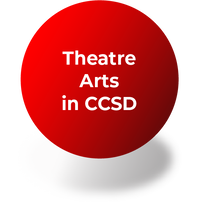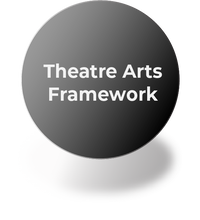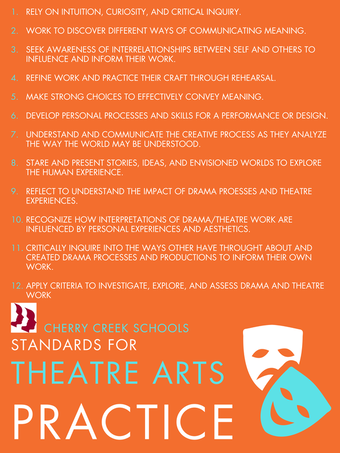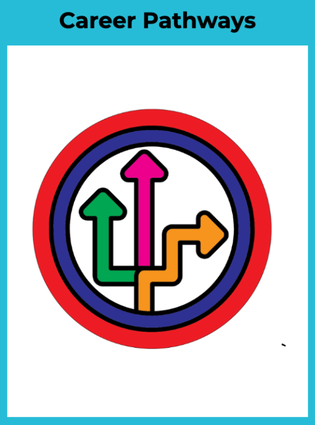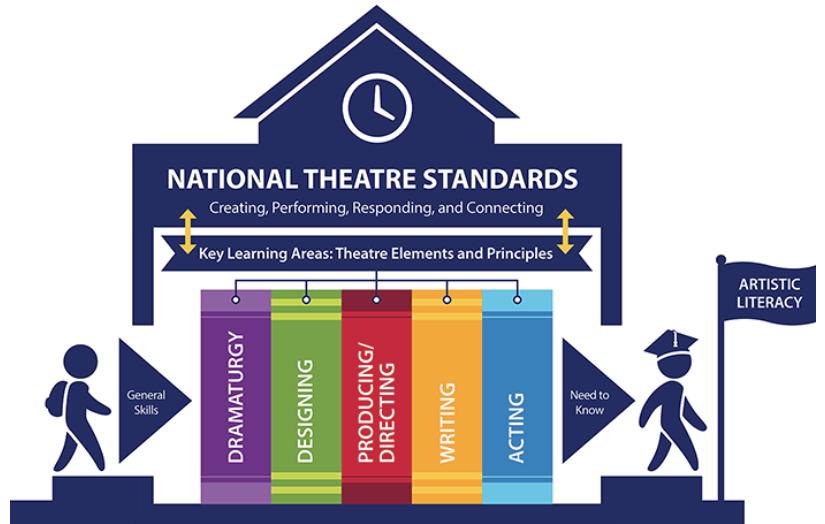Welcome to Theatre Arts
Click the buttons below for quick access to content
Click the buttons below for quick access to content
Theatre Arts are Important to Life and Learning Theatre arts are a universal force in the everyday life of people around the world. This force connects each new generation to those who have gone before. Students need theatre arts to make these connections and to express the otherwise inexpressible. Theatre, the imagined and enacted world of human beings, is one of the primary ways children learn about life – about actions and consequences, customs and beliefs, and others and themselves.
Theatre arts benefit the student because they cultivate the whole person, gradually building many kinds of literacy, including innovations in technology, while developing intuition, reasoning, imagination, and dexterity into unique forms of expression and communication. Theatre honors imagination and creativity, and students who engage in theatre benefit from learning these skills and many others that prepare them for the 21st century. Additionally, as they work at increasing their understanding of the challenges presented by theatre arts, they prepare to make their own contributions to the nation's storehouse of culture. The theatre process also is important for a student’s individual growth. A strong and clear sense of the theatre process, which takes the creative theatrical act from inception to completion, teaches the importance of follow-through and responsibility.
Theatre arts have both intrinsic and instrumental value. That is, they have worth in and of themselves and also can be used to achieve a multitude of purposes such as to present issues and ideas, to teach or persuade, to entertain, to design, to plan, and to beautify. Students grow in their ability to comprehend their world when they learn theatre arts. As they create dances, music, theatrical productions, and visual works of art, they learn how to express themselves and how to communicate with others. Because theatre arts offer the continuing challenge of situations in which there is no standard or approved answer, those who study the arts become acquainted with many perspectives on the meaning of "artistic value." The modes of thinking and methods of theatre arts disciplines can be used to illuminate situations in other disciplines that require creative solutions. Attributes necessary to the arts such as self-discipline, collaboration, and perseverance transfer to the rest of life.
The more students live up to these high expectations, the more empowered our citizenry becomes. Indeed, helping students meet these standards is among the best possible investment in the future of not only our children, but also our country and civilization.
Theatre arts benefit the student because they cultivate the whole person, gradually building many kinds of literacy, including innovations in technology, while developing intuition, reasoning, imagination, and dexterity into unique forms of expression and communication. Theatre honors imagination and creativity, and students who engage in theatre benefit from learning these skills and many others that prepare them for the 21st century. Additionally, as they work at increasing their understanding of the challenges presented by theatre arts, they prepare to make their own contributions to the nation's storehouse of culture. The theatre process also is important for a student’s individual growth. A strong and clear sense of the theatre process, which takes the creative theatrical act from inception to completion, teaches the importance of follow-through and responsibility.
Theatre arts have both intrinsic and instrumental value. That is, they have worth in and of themselves and also can be used to achieve a multitude of purposes such as to present issues and ideas, to teach or persuade, to entertain, to design, to plan, and to beautify. Students grow in their ability to comprehend their world when they learn theatre arts. As they create dances, music, theatrical productions, and visual works of art, they learn how to express themselves and how to communicate with others. Because theatre arts offer the continuing challenge of situations in which there is no standard or approved answer, those who study the arts become acquainted with many perspectives on the meaning of "artistic value." The modes of thinking and methods of theatre arts disciplines can be used to illuminate situations in other disciplines that require creative solutions. Attributes necessary to the arts such as self-discipline, collaboration, and perseverance transfer to the rest of life.
The more students live up to these high expectations, the more empowered our citizenry becomes. Indeed, helping students meet these standards is among the best possible investment in the future of not only our children, but also our country and civilization.
(Click on a grade level to open standards in a new window)
Middle School
High School
The theatre arts Teaching and Learning Framework is used in teaching the Colorado Academic Standards
to meet the needs of EVERY student EVERY day.
The instructional framework for theatre arts is divided into three components: "Student Practices," "Teacher Practices," and "Career Pathways ." Taken together, these comprehensively describe high-quality teaching and learning in theatre arts.
(Click on the icons below for more detailed information).
to meet the needs of EVERY student EVERY day.
The instructional framework for theatre arts is divided into three components: "Student Practices," "Teacher Practices," and "Career Pathways ." Taken together, these comprehensively describe high-quality teaching and learning in theatre arts.
(Click on the icons below for more detailed information).
|
Dr. Paul Cribari
Assistant Director Office of Curriculum and Instruction 720.554.5061 [email protected] Instructional Support Facility 5416 S. Riviera Way Aurora,CO 80015 |
